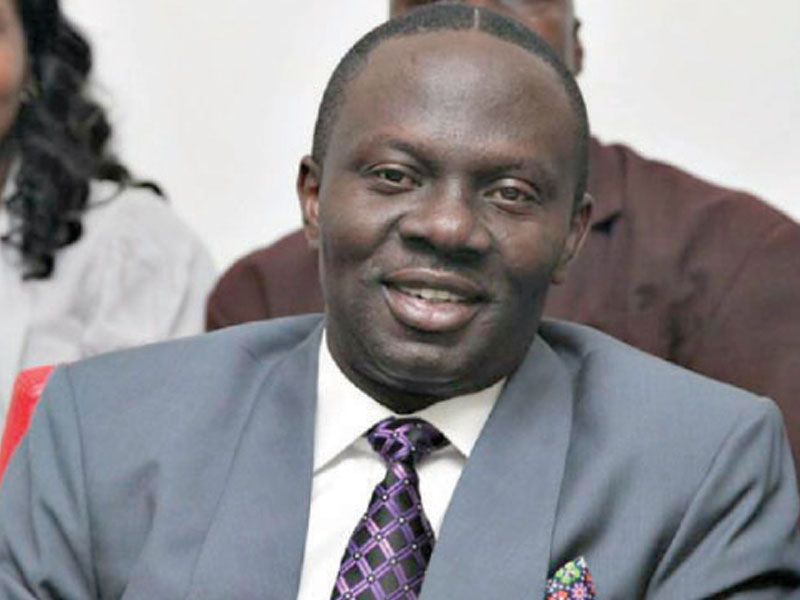Dangote vs Bello: Where are our leaders? By Martins Oloja
The integrity of Nigeria’s business environment is being tested again as those who have responsibility to prepare Africa’s richest economy for Ease of Doing Business already have a critical assignment in a state near the nation’s capital. And here is the testing ground: There is a strange crisis over the ownership of the 14-year old Obajana cement plant in Kogi State. The emergency boiled over on Friday when the State Government and Dangote Cement Plc began a dirty fight over claims to the facility. The management of the firm opened in 2008 has vowed to take legal action over the recent invasion of the plant and the shooting of its employees by armed vigilantes allegedly on the orders of the government.
Pandemonium actually broke out last Wednesday when officials of the Kogi State Government moved to seal off the cement plant, which it claimed belonged to the state. Although the government said one person was shot during the chaos that ensued, the cement company claimed that vigilantes acting on the orders of the state government shot 27 of its workers.
Governor of Kogi State, Yahaya Bello had on Thursday said the state government would be ready to negotiate with Dangote Group once the firm was ready to admit that the plant belonged to the state. Speaking when he presented documents from the report of the Specialised Technical Committee on the Evaluation of the Legality of the Alleged Acquisition of Obajana Cement Company Plc by Dangote Cement Company Limited to back the state’s claim to the ownership of the plant, Yahaya said the decision to seal off the plant followed several petitions by members of the local community over marginalisation by the company.
Bello’s words: “We received several petitions from the general public over this particular subject matter. In the past five to six years, all efforts to sit with the proprietors of the Dangote Conglomerate failed.”
But Dangote Cement Plc, in a statement titled, ‘Illegal Shutdown of Dangote Cement, Obajana Plant,’ and signed by its Group Managing Director, Michel Puchercos, said the armed invaders acted on a resolution of the state House of Assembly on controversial tax claims, which it added that the governor had contradicted when he said the shutdown was due to an alleged invalid acquisition of the company by Dangote Industries Limited.
“In the process of forcefully evicting the workers to enforce the shutdown, the vigilantes shot at 27 of our workers and also destroyed some of the company’s property at the plant. We have taken steps to get the hoodlums apprehended by law enforcement agencies, and we will ensure that full legal action is taken against them.
“While we reiterate that Obajana Cement plant is 100% owned by Dangote Cement PLC, we remain resolute in transforming Africa, while creating sustainable value for our people, communities, investors, and customers,” the statement partly read. The state government, however, accused the cement company of distorting the facts and vowed to recover all accrued dividends from profits made over the years by the Dangote Group, including accrued interests on the same. The Commissioner for Information, Kingsley Fanwo, in a statement on Friday, titled, ‘Dangote is distorting facts – Govt,’ said the state had all the relevant documents to prove that the purported acquisition of Obajana (cement plant) by Dangote was null and void.
“We want to assure the good people of Kogi State that, with God on our side, what belongs to the state shall be recovered, including all dividends and interests on profits from inception till date. The Dangote Group is just distorting facts to save its face,” Fanwo added.
There are reasons to believe that stakeholders, state actors and even regulatory agencies may not be interested in this crisis between Africa’s foremost investor and Kogi State government because there is politics in the air. And there is still unitary system of government, which sustains revenue sharing among the three tiers of government every month in Abuja.
In Africa’s richest country, state actors always place more premium on politics over governance. What state actors and the governors would like to see at this time is for Dangote Group Chairman, Aliko to donate heavily to the political campaign funds including Kogi’s even after they have closed down one of the major sources of his income. This is a time to call on Nigeria’s leader, governing party and the relevant ministries in charge of Trade and Industry to wade in and resolve this crisis before it is too late. One does not need any permission to say that the cement plant in Obajana, which was at inception (2008) with its two lines totalling 5Mta, touted then as the largest cement factory in Sub-Saharan Africa, is too important to be shut down at this time of economic crisis. This is not to say that the Dangote Group should be above the law. This is just an appeal to the authorities in Kogi that they too should not take the laws into their hands.
The quick intervention of the National Association of Chambers of Commerce, Industries, Mines and Agriculture, which has condemned the closure of the cement factory, is instructive and timely. The NACCIMA said at the weekend that the action (closure) would not necessarily help the controversial issue of compliance on tax remittable to state government. “Rather a continuous operation of the plant would more likely facilitate a faster resolution of the dispute,” its Director-General, Olusola Obadimu, added. Similarly, the Lagos Chamber of Commerce and Industry, which has warned that wrong handling of the ownership tussle or unprofessional approaches to resolutions could send negative signals to potential foreign investors, should not be ignored at this time.
While it is expedient to condemn the attack on the Dangote Cement plant and condole with the families of those injured, it is also important that those who are watching over Ease of Doing Business in Nigeria in the office of our Vice President should note that the crisis in Kogi State is a reflection of the poor handling of investment protection issues in the country. Foreign direct investors that our governors have been going abroad to woo are noting the brewing crisis over ownership of a 14-year old cement factory.
I would like to join those who have recommended a meeting of all government agencies connected with the acquisition of the cement plant to resolve any differences whatsoever. This process can be handled without shutting down the factory and endangering jobs, products, and government revenues. This is strictly business dispute in this digital environment and so the world is watching what is happening to Africa’s richest man’s business.
Doubtless, tax and ownership disputes should not be left to miscreants as trucks have been burnt and workers injured in the fracas that began last Wednesday. Governor Bello who just ran a robust presidential primary campaign needs all the goodwill and support of the federal government and corporate organisations to take care of victims of unprecedented flood disaster in the state. He should not allow hoodlums and misguided elements to destroy arguably the most valuable production plant in Nigeria’s north-central region. He should organise for the immediate reopening of the factory and the commencement of alternative dispute resolution (ODR) mechanism. Let’s repeat this line: The closure of the factory will further increase unemployment and worsen insecurity in the state.
To those who don’t understand the importance of a good business environment for economic development, South Africa is by far the most industrialised economy and one of the easiest countries to do business in Africa with its advanced legal and financial structures. This is what you will find in even international business journals. They are quite organised. We are not.
Nigeria is ranked 131 among 190 economies in the ease of doing business, according to the latest World Bank annual ratings. Mauritius, Rwanda and Morocco are the top three. Kenya is No.4, Tunnisia No.5 while South Africa is No.6, Zambia No.7, Togo No.8 Seychelles No.9 while Ivory Coast is No.10.
Nigeria is nowhere respectable yet because the Nigerian business environment has been polarised with lots of challenges spawning fear as a result of insecurity, uncertainty, political, environmental and cultural disparities, leading to the collapse of various business outfits particularly, micro small and medium-scale enterprises (MSME) and the relocation of the big ones to other countries.
Reeling out the challenges bedevilling the business environment of Nigeria, a report by the United Kingdom, UK, department of international trade: Overseas business: Nigeria, states: “The Nigerian economy is characterised by extreme inequality and significant economic disparities between the North and the South, poor infrastructure, a complex and opaque regulatory environment, corruption and a fast-growing population. Oil provides the bulk of Nigeria’s government revenue and almost all of its foreign exchange earnings. “Slow economic growth is of concern. The latest IMF forecasts project that the economy is to grow by 2.7% in 2022 and is expected to grow between 2.6% and 2.7% over the 2022 to 2026 period, just barely above population growth estimates, and insufficient to create the scale of jobs required and to reduce poverty being experienced. Too few jobs are being created for the 3.5 million young Nigerians coming of working age annually, adding to the pool of under or unemployed.”
In pursuance of this administration’s goal to improve Nigeria’s ease of doing business ratings, President Mohammadu Buhari inaugurated the Presidential Enabling Business Environment Council (PEBEC), chaired by the Vice President, in July 2016. The PEBEC comprises the Minister of Industry, Trade and Investment (MITI) as Vice-Chair, nine (9) other ministers, the Head of Service of the Federation, Governor of the Central Bank, representatives of the National Assembly, and the private sector. PEBEC’s mandate is to make recommendations on institutional reforms to promote Nigeria’s investment attractiveness. A Federal Executive Council (FEC) presided over by the Vice President, Yemi Osibanjo endorsed the Presidential Enabling Business Environment Council, PEBEC Bill in July 2016, which sought to set the ball rolling in the country’s business environment; and to also maintain a proper business climate.
The omnibus bill is seeking to amend twenty-three (23) business-related laws in Nigeria and the overall benefits of the bill include ensuring efficiency in public service delivery in terms of time, cost, and procedure for doing business, improving transparency, removing outdated provisions from relevant laws, and providing incentives to encourage Micro, Small, and Medium Enterprises (MSMEs) participation in business, among other things.
The government was convinced that taking affirmative steps of due process, diligence and the ease of doing business will trickle down to the ease of delivering national economic prosperity and achieving distinctive national aspirations. Whether the Enabling Business Environment Council has delivered on its mandate since 2016 isn’t the remit here today. But the Council has a responsibility to collaborate with relevant authorities and agencies to resolve the current disruptive dispute over Obajana cement factory in Kogi State. This is in public interest.
Culled from The Guardian




